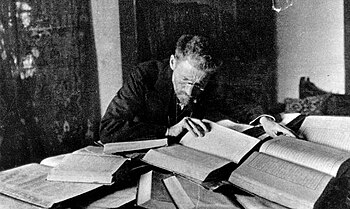Portal:Hebrew/Introduction
|
Hebrew (/ˈhiːbruː/) (עִבְרִית, Ivrit, ( Modern Hebrew is one of the two official languages of Israel, while Classical Hebrew is used for prayer or study in Jewish communities around the world. The language is attested from the 10th century BCE to the late Second Temple period, after which the language developed into Mishnaic Hebrew. Modern Hebrew is one of the official languages of Israel, along with Arabic. Ancient Hebrew is also the liturgical tongue of the Samaritans, while modern Hebrew or Arabic is their vernacular, though today only about 700 Samaritans remain. As a foreign language it is studied mostly by Jews and students of Judaism and Israel, archaeologists and linguists specializing in the Middle East and its civilizations, by theologians, and in Christian seminaries. The core of the Torah (the first five books of the Hebrew Bible), and most of the rest of the Hebrew Bible, is written in Classical Hebrew, and much of its present form is specifically the dialect of Biblical Hebrew that scholars believe flourished around the 6th century BCE. |
 |